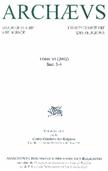La fonction catalytique de l'exaiphnes chez Denis
The Notion of exaiphnes in the Greek Philosophy. From Neo-Platonism to Denys of Areopagite
Author(s): Evanghélos MoutsopoulosSubject(s): Comparative Studies of Religion
Published by: Romanian Assoc. for the History of Religions & Inst. for the History of Religions, Romanian Academy
Keywords: kairos; greek philosophy; Parmenidian dualism; the discontinuity of the ontological interval between being and non-being; neo-platonic authors; the category of sudden (fr. brusque; soudain; prompt; fulgurant; subit);
Summary/Abstract: The well-known historian of Ancient Philosophy, distinguished by his research of the concept of kairos, discusses a particular chapter of the more general problem concerning the means by which the Neo-platonic authors, from Philo of Alexandria to Plotin and Proclus, alleviated the difficulties inherent to the Parmenidian dualism. The focus of Dr Moutsopoulos’ article is the question of the discontinuity of the interval between being and non-being, which the Neo-platonic authors saturated with different intermediary ontological values. Furthermore, Moutsopoulos’ study tackles the category of suddenness (fr. brusque, soudain, prompt, fulgurant, subit), expressed in the writings of the neo-platonic authors by the Greek adverb exaiphnes. This was contrasted by another category of the discontinuous temporality, namely kairos. If the notion of kairos indicates a form of temporal discontinuity established by the active function of the conscience (i.e.: the intentionality), the notion of suddenness denotes something independent of the conscience, which is affected by it but remains fundamentally passive against it.
Journal: ARCHÆVS. Studies in the History of Religions
- Issue Year: VI/2002
- Issue No: 01-04
- Page Range: 45-54
- Page Count: 10
- Language: French
- Content File-PDF

